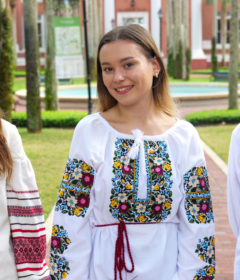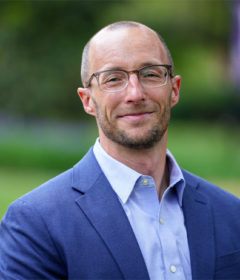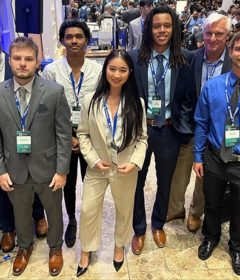The value of spirituality
 This is the fourth and final story in a series, “Values Quest,” in the Summer 2014 Stetson Magazine.
This is the fourth and final story in a series, “Values Quest,” in the Summer 2014 Stetson Magazine.
A 1997 document about Stetson “Heritage and Values” begins this way: “From its origin, Stetson University has maintained the importance of religion and ethics in the university mission. The university motto, ‘For God and Truth,’ is an ongoing symbol of this commitment, as well as an expression of Stetson’s determination to integrate ‘the question of God’ and ‘the quest for meaning’ as central components in our mission to educate.”
The document continues: “The Christian influence has been, and continues to be, profound at Stetson. The non-Christian influence has been, and is, profound as well.”
That spiritual exploration continues today but in a more nonsectarian way. In fact, there is even a Secular Student Association that recently sponsored a lecture on “Good Without God” and gone are the days of mandatory chapel.
“Faith comes in many packages, and for many, no package at all,” says University Chaplain Michael Fronk, ’74. “As chaplain, my mission is to be a fellow traveler with our students, faculty and staff as they explore their spiritual lives, either through traditional faith expressions or personal spiritual exploration.”
Fronk hosts two services during the week and teaches a class on faith rituals and traditions in the Department of Religious Studies. The monthly FRIDAYS@12 is a faith experience where students participate with a tradition they may be unfamiliar with. “In this way, we celebrate the diversity of faiths on our campus,” he explains.
The second activity is the weekly “Gathering,” Sundays at 5 p.m. in Lee Chapel. “It’s a reflective time filled with music, readings, prayers and guest speakers,” he adds. “The ‘Gathering’ is nondenominational and open to everyone. It’s a wonderful way to end the week and prepare for the next.”
A Stetson graduate himself, Fronk contrasts today with yesterday. “It used to be that the idea of being religious tended to pigeonhole you with what religion you followed,” he says. “But spirituality is a little more elusive. By its very nature, spirit is hard to grab. And we find some of our students today not having a religious brand loyalty.”
Therefore, Stetson’s spiritual circle has widened to be more inclusive, he stresses.
Fronk believes, then, that more students, both from traditional religious viewpoints as well as atheists and agnostics, are asking more questions about social justice issues, “particularly a voice that speaks for those who are underprivileged, who have no voice.”
But some things never change. “We still find, however, that the values of faith and spirituality involve asking questions about ‘who am I?’ and ‘why am I here’?”
Moreover, Fronk also recognizes that the spiritual in all of us connects with values. For example, Stetson’s values about the environment connect to the sacred because “this is the only Earth we get, and we’re entrusted with taking care of our garden.”
Today, Stetson explores different faiths and no faith. Special programs on Buddhism, Christianity, Islam and Judaism, along with other spiritual views, happen frequently on campus.
As a matter of fact, there is a new position to encourage this dialogue. Lindsey Graves, the new assistant director of interfaith initiatives, looks at the word “interfaith” as an inclusive term, and that “it’s learning how to develop this language to include everyone, especially those who are asking the bigger questions.”
And spirituality, according to Graves, helps us to reflect on our own beliefs and values. “The value of spirituality helps us to understand other social classes, other races, other cultures that we may not have seen before.” As a result, she believes that when people embark on an interfaith dialogue experience they learn about other traditions and other cultures.
“Spirituality can make your world a lot bigger,” she says.
A Perceived Need for Values
Parents want their children to have values. In a recent New York Times article titled “Raising a Moral Child” by Adam Grant, professor of management and psychology at the University of Pennsylvania, parents around the world, according to several surveys, want their children to be kind and compassionate more so than for them to become successful.
“When people in 50 countries were asked to report their guiding principles in life, the value that mattered most was not achievement, but caring,” Grant writes.
“Genetic twin studies suggest that anywhere from a quarter to more than half of our propensity to be giving and caring is inherited,” he continues. “That leaves a lot of room for nurture.”
And interestingly enough, “Children learn generosity not by listening to what their role models say, but by observing what they do,” according to a classic experiment by the psychologist J. Philippe Rushton.
Grant quotes the psychologist Karl Weick as asking, “How can I know who I am until I see what I do? How can I know what I value until I see where I walk?”
And that’s where Stetson professors come in. For example, Maria Rickling, Ph.D., assistant professor of accounting, says: “The theme that runs through the university is this commitment to values that permeates Stetson. It’s just built into what we do.”
Rickling contends that “so many Stetson faculty challenge their students to develop their own argument,” but it’s also about considering what impact a person’s actions or lack thereof will have on those right next to you, those at your job and those in the world.
In this way, “Students begin to understand after their four years at Stetson how to take information, assimilate it so they can form their own beliefs or even to challenge their own opinions.”
Rickling uses her own field of accounting as an example. “Most of us think of accounting as mostly black and white, a social science,” she explains. “After all, it’s financial reporting. How could accounting possibly tie into social responsibility? Actually, accounting has a huge, huge impact.”
A case in point: Many believe that accountants didn’t exercise due professional care when auditing the financial statements of banks and other financial institutions. These actions resulted in the overvaluation of toxic assets that played a large role in the 2008 Great Recession.
“We’re now teaching the ethics behind accounting even in the principles course,” she explains. “You give students that perspective right up front about the role accounting plays in terms of conveying truthful information about a firm. Because if it’s not truthful, the implication that has on society and the world can be devastating.”
Like many of her colleagues, Rickling notes that Stetson students are values-inclined. “Our students graduate from Stetson not only being able to reason on their own, but they recognize the impact their decisions might have on others. With this knowledge, they graduate with the ability to change the world.”
by Bill Noblitt
Editor, Stetson Magazine



